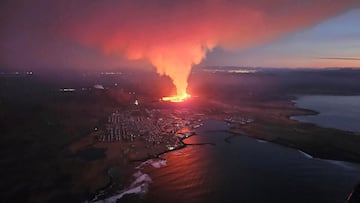Iceland volcano: Can the Grindavik eruption affect air traffic in the US?
Volcanic eruptions present dangers to the engines of airplanes and have on occasions resulted in disrupts in flights even keeping planes on the ground.

Icelandic volcanic eruptions have a habit of forcing planes to stay grounded such as in the 2010 eruption Eyjafjallajökull. That event led to widespread disruption in air travel across Europe. The ash plume reached high altitudes, and prevailing winds carried it southeast across Europe.
Iceland is a very volcanic country situated between the United Kingdom and Greenland and it has approximately 130 volcanoes with 33 active. 2023 has had its share of eruptions and the most recent near Grindavik, the second in a month, could be a risk in the coming days.
The burning lava now less than 500 meters from the #Grindavik northern houses. pic.twitter.com/SWWTHQWsLm
— Ólafur Ragnar Grímsson (@ORGrimsson) January 14, 2024
How an eruption could affect air traffic in the US
The main concern during a volcanic eruption is the release of ash into the atmosphere. Volcanic ash is made up of fine particles of pulverised rock and glass; extremely hazardous to aircraft engines. A violent eruption may produce an ash cloud that could be carried by prevailing winds over the Atlantic towards North America.
The danger of ash to aircraft
Volcanic ash casues damage to aircraft engines, particularly jet engines, as the fine particles melt and solidify inside the engine, leading to a loss of engine power.
To ensure the safety of air travel, airspace may be closed or restricted in areas affected by volcanic ash. This would inevitably lead to flight cancellations, diversions, and delays for flights heading to or from the United States, particularly those flying over the North Atlantic routes.
However, Reykjavik’s nearby Keflavik International Airport remained open during the first eruption and has not been closed this time either for now, but authorities are keeping an eye on the developing situation. “Aircraft operators base their decisions on continued flights on aspects such as the ash forecasts of the Icelandic Met Office and its partners,” states Isavia, the national airport and air navigation service.
The results of an eruption on airlines
Related stories
To avoid these risks, airlines would choose to reroute flights to avoid these ash-affected areas. Schedules will be disrupted as flights take longer by avoiding certain areas or be cancelled altogether. During the 2010 Eyjafjallajökull volcano more than 100,000 flights were cancelled.
The disruption of air travel has broader economic implications, affecting airlines but also businesses and travelers. Flight cancellations and delays would lead to financial losses for airlines and related industries, and travelers may find it difficult to get their money back with the huge disruption. Again referring to 2010, airlines lost $1.7 billion in revenue with more than 7 million passengers affected.

